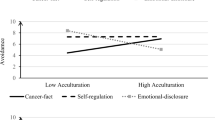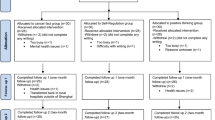Abstract
Purpose
Posttraumatic stress disorder (PTSD) is a significant condition among breast cancer survivors (BCSs). However, few intervention studies for cancer-related PTSD were conducted among Asian cancer survivors. We evaluated a culturally sensitive expressive writing intervention, which combined cognitive reappraisal and emotional disclosure, in reducing PTSD among Chinese American BCSs. We also tested social constraints (defined as social conditions when individuals feel misunderstood or alienated when they desire to disclose their thoughts and feelings) as a moderator.
Methods
Chinese American BCSs (n = 136) were randomly assigned to three groups with assigned writing topics for 3 weeks: a self-regulation group, which wrote about the deepest feelings related to cancer in week 1, cognitive reappraisal about stress and coping in week 2, and benefit finding in week 3; an enhanced self-regulation group, with the same instructions, except weeks 1 and 2 were reversed; and a cancer-fact group, which wrote about cancer experiences objectively for 3 weeks. PTSD symptoms were measured at baseline and 1-, 3-, and 6-month follow-ups. Social constraints were measured at baseline.
Results
Both the self-regulation and enhanced self-regulation groups showed reduced PTSD symptoms compared to the cancer-fact group. For reexperiencing and hyperarousal symptoms, expressive writing was more effective for BCSs who experienced high vs. low levels of social constraints; the opposite was found for avoidance symptoms.
Conclusion
Findings demonstrated the effectiveness of expressive writing intervention in reducing PTSD for this minority population, and that the moderating role of survivors’ social network varies among different PTSD symptom clusters.
ClinicalTrials.gov Identifier: NCT02946619.

Similar content being viewed by others
References
Carreira, H., Williams, R., Muller, M., Harewood, R., Stanway, S., & Bhaskaran, K. (2018). Associations between breast cancer survivorship and adverse mental health outcomes: A systematic review. Journal of the National Cancer Institute,110(12), 1311–1327. https://doi.org/10.1093/jnci/djy177.
Smith, S. K., Zimmerman, S., Williams, C. S., Benecha, H., Abernethy, A. P., Mayer, D. K., et al. (2011). Post-traumatic stress symptoms in long-term non-Hodgkin’s lymphoma survivors: Does time heal? Journal of Clinical Oncology,29(34), 4526–4533. https://doi.org/10.1200/jco.2011.37.2631.
Chan, C. M. H., Ng, C. G., Taib, N. A., Wee, L. H., Krupat, E., & Meyer, F. (2018). Course and predictors of post-traumatic stress disorder in a cohort of psychologically distressed patients with cancer: A 4-year follow-up study. Cancer,124(2), 406–416. https://doi.org/10.1002/cncr.30980.
Horowitz, M. J. (2001). Stress response syndromes (3rd ed.). New York: Jason Aronson.
Lepore, S. J., & Revenson, T. A. (2007). Social constraints on disclosure and adjustment to cancer. Social and Personality Psychology Compass,1(1), 313–333. https://doi.org/10.1111/j.1751-9004.2007.00013.x.
Lopez, G., Ruiz, N. G., & Patten, E. (2017). Key facts about Asian Americans, a diverse and growing population. Washington, DC: Pew Research Center.
Torre, L. A., Sauer, A. M., Chen, M. S., Jr., Kagawa-Singer, M., Jemal, A., & Siegel, R. L. (2016). Cancer statistics for Asian Americans, Native Hawaiians, and Pacific Islanders, 2016: Converging incidence in males and females. CA: A Cancer Journal for Clinicians,66(3), 182–202. https://doi.org/10.3322/caac.21335.
Gomez, S. L., Von Behren, J., McKinley, M., Clarke, C. A., Shariff-Marco, S., Cheng, I., et al. (2017). Breast cancer in Asian Americans in California, 1988–2013: increasing incidence trends and recent data on breast cancer subtypes. Breast Cancer Research and Treatment,164(1), 139–147. https://doi.org/10.1007/s10549-017-4229-1.
Lee, S., Chen, L., Ma, G. X., Fang, C. Y., Oh, Y., & Scully, L. (2013). Challenges and needs of Chinese and Korean American breast cancer survivors: In-depth interviews. N Am J Med Sci,6(1), 1–8. https://doi.org/10.7156/najms.2013.0601001.
Lee, S. K., & Knobf, M. T. (2016). Family involvement for breast cancer decision making among Chinese-American women. Psychooncology,25(12), 1493–1499. https://doi.org/10.1002/pon.3989.
Warmoth, K., Cheung, B., You, J., Yeung, N. C. Y., & Lu, Q. (2017). Exploring the social needs and challenges of Chinese American immigrant breast cancer survivors: A qualitative study using an expressive writing approach. Int J Behav Med,24(6), 827–835. https://doi.org/10.1007/s12529-017-9661-4.
Lee-Lin, F., Menon, U., Nail, L., & Lutz, K. F. (2012). Findings from focus groups indicating what Chinese American immigrant women think about breast cancer and breast cancer screening. Journal of Obstetric, Gynecologic, and Neonatal Nursing,41(5), 627–637. https://doi.org/10.1111/j.1552-6909.2012.01348.x.
Lepore, S. J. (2001). A social-cognitive processing model of emotional adjustment to cancer. Psychosocial Interventions for Cancer (pp. 99–116). Washington, DC: American Psychological Association.
Lu, Q., Zheng, D., Young, L., Kagawa-Singer, M., & Loh, A. (2012). A pilot study of expressive writing intervention among Chinese-speaking breast cancer survivors. Health Psychology,31(5), 548–551. https://doi.org/10.1037/a0026834.
Lepore, S. J., Revenson, T. A., Roberts, K. J., Pranikoff, J. R., & Davey, A. (2015). Randomised controlled trial of expressive writing and quality of life in men and women treated for colon or rectal cancer. Psychol Health,30(3), 284–300. https://doi.org/10.1080/08870446.2014.971798.
Abbey, G., Thompson, S. B., Hickish, T., & Heathcote, D. (2015). A meta-analysis of prevalence rates and moderating factors for cancer-related post-traumatic stress disorder. Psychooncology,24(4), 371–381. https://doi.org/10.1002/pon.3654.
Merz, E. L., Fox, R. S., & Malcarne, V. L. (2014). Expressive writing interventions in cancer patients: A systematic review. Health Psychology Review,8(3), 339–361. https://doi.org/10.1080/17437199.2014.882007.
Chu, Q., Wong, C. C. Y., & Lu, Q. (2019). Acculturation moderates the effects of expressive writing on post-traumatic stress symptoms among Chinese American breast cancer survivors. Int J Behav Med,26(2), 185–194. https://doi.org/10.1007/s12529-019-09769-4.
Knowles, E. D., Wearing, J. R., & Campos, B. (2011). Culture and the health benefits of expressive writing. Social Psychological and Personality Science,2(4), 408–415. https://doi.org/10.1177/1948550610395780.
Lu, Q., & Stanton, A. L. (2010). How benefits of expressive writing vary as a function of writing instructions, ethnicity and ambivalence over emotional expression. Psychol Health,25(6), 669–684. https://doi.org/10.1080/08870440902883196.
Lu, Q., Wong, C. C., Gallagher, M. W., Tou, R. Y., Young, L., & Loh, A. (2017). Expressive writing among Chinese American breast cancer survivors: A randomized controlled trial. Health Psychology,36(4), 370–379. https://doi.org/10.1037/hea0000449.
Wei, M., Su, J. C., Carrera, S., Lin, S. P., & Yi, F. (2013). Suppression and interpersonal harmony: A cross-cultural comparison between Chinese and European Americans. Journal of Counseling Psychology,60(4), 625–633. https://doi.org/10.1037/a0033413.
Chen, S. H., Zhou, Q., Main, A., & Lee, E. H. (2015). Chinese American immigrant parents’ emotional expression in the family: Relations with parents’ cultural orientations and children’s emotion-related regulation. Cultural Diversity and Ethnic Minority Psychology,21(4), 619–629. https://doi.org/10.1037/cdp0000013.
Badr, H., & Taylor, C. L. (2006). Social constraints and spousal communication in lung cancer. Psychooncology,15(8), 673–683. https://doi.org/10.1002/pon.996.
Pistrang, N., & Barker, C. (2005). How partners talk in times of stress: A process analysis approach. Couples coping with stress: Emerging perspectives on dyadic coping (pp. 97–119). Washington, DC: American Psychological Association.
Kolokotroni, P., Anagnostopoulos, F., & Hantzi, A. (2018). The role of optimism, social constraints, coping, and cognitive processing in psychosocial adjustment among breast cancer survivors. Journal of Clinical Psychology in Medical Settings,25(4), 452–462. https://doi.org/10.1007/s10880-018-9555-x.
de Moor, J. S., Moye, L., Low, M. D., Rivera, E., Singletary, S. E., Fouladi, R. T., et al. (2008). Expressive writing as a presurgical stress management intervention for breast cancer patients. Journal of the Society for Integrative Oncology,6(2), 59–66.
Zakowski, S. G., Ramati, A., Morton, C., Johnson, P., & Flanigan, R. (2004). Written emotional disclosure buffers the effects of social constraints on distress among cancer patients. Health Psychology,23(6), 555–563. https://doi.org/10.1037/0278-6133.23.6.555.
Jensen-Johansen, M. B., Christensen, S., Valdimarsdottir, H., Zakowski, S., Jensen, A. B., Bovbjerg, D. H., et al. (2013). Effects of an expressive writing intervention on cancer-related distress in Danish breast cancer survivors: Results from a nationwide randomized clinical trial. Psychooncology,22(7), 1492–1500. https://doi.org/10.1002/pon.3193.
Lu, Q., Gallagher, M. W., Loh, A., & Young, L. (2018). Expressive writing intervention improves quality of life among Chinese-American breast cancer survivors: A randomized controlled trial. Annals of Behavioral Medicine,52(11), 952–962. https://doi.org/10.1093/abm/kax067.
Lepore, S., & Ituarte, P. H. (1999). Optimism about cancer enhances mood by reducing negative social interactions. Cancer Research, Therapy and Control,8(3), 165–174.
Wong, C. C. Y., & Lu, Q. (2016). Do social constraints always hurt? Acculturation moderates the relationships between social constraints and physical symptoms of Chinese American breast cancer survivors. Asian American Journal of Psychology,7(2), 129–136. https://doi.org/10.1037/aap0000045.
Yeung, N. C. Y., Ramirez, J., & Lu, Q. (2017). Perceived stress as a mediator between social constraints and sleep quality among Chinese American breast cancer survivors. Supportive Care in Cancer,25(7), 2249–2257. https://doi.org/10.1007/s00520-017-3632-9.
American Psychiatric Association. (2013). Diagnostic and statistical manual of mental disorders (5th ed.). Washington, DC: American Psychiatric Association Press.
American Psychiatric Association. (2000). Diagnostic and statistical manual of mental disorders (4th ed.). Washington, DC: American Psychiatric Association.
Foa, E. B., Riggs, D. S., Dancu, C. V., & Rothbaum, B. O. (1993). Reliability and validity of a brief instrument for assessing post-traumatic stress disorder. Journal of Traumatic Stress,6(4), 459–473. https://doi.org/10.1002/jts.2490060405.
Lazarus, R. S., & Folkman, S. (1984). Stress, appraisal, and coping. New York: Springer.
Hall, G. C., Ibaraki, A. Y., Huang, E. R., Marti, C. N., & Stice, E. (2016). A meta-analysis of cultural adaptations of psychological interventions. Behavior Therapy,47(6), 993–1014. https://doi.org/10.1016/j.beth.2016.09.005.
Sue, S., Zane, N., Nagayama Hall, G. C., & Berger, L. K. (2009). The case for cultural competency in psychotherapeutic interventions. Annual Review of Psychology,60, 525–548. https://doi.org/10.1146/annurev.psych.60.110707.163651.
Wong, C. C. Y., Warmoth, K., Ivy, S., Cheung, B., & Lu, Q. (2018). Relation of social constraints on disclosure to adjustment among Chinese American cancer survivors: A multiprocesses approach. Psychooncology,27(3), 977–982. https://doi.org/10.1002/pon.4604.
Cohee, A. A., Stump, T., Adams, R. N., Johns, S. A., Von Ah, D., Zoppi, K., et al. (2016). Factors associated with depressive symptoms in young long-term breast cancer survivors. Quality of Life Research,25(8), 1991–1997. https://doi.org/10.1007/s11136-016-1241-6.
Funding
This study was funded by the American Cancer Society (MRSGT-10-011-01-CPPB: PI Qian Lu).
Author information
Authors and Affiliations
Contributions
All authors contributed to the study conception and design of this secondary data analysis and QL contributed to the original study design. Data analysis was performed by QC and IW. The first draft of the manuscript was written by QC and all authors commented on previous versions of the manuscript. All authors read and approved the final manuscript.
Corresponding author
Ethics declarations
Conflict of interest
The authors declare that they have no conflict of interest.
Ethical approval
All procedures performed in studies involving human participants were in accordance with the ethical standards of The University of Texas MD Anderson Cancer Center (Protocol Number: PA18-0590) and University of Houston (Protocol Number: 16493-EX) and with the 1964 Helsinki Declaration and its later amendments or comparable ethical standards.
Informed consent
Informed consent was obtained from all individual participants included in the study.
Additional information
Publisher's Note
Springer Nature remains neutral with regard to jurisdictional claims in published maps and institutional affiliations.
Data analysis of the present study was performed when Dr. Qiao Chu was a postdoctoral fellow at The University of Texas MD Anderson Cancer Center.
Rights and permissions
About this article
Cite this article
Chu, Q., Wu, I.H.C. & Lu, Q. Expressive writing intervention for posttraumatic stress disorder among Chinese American breast cancer survivors: the moderating role of social constraints. Qual Life Res 29, 891–899 (2020). https://doi.org/10.1007/s11136-019-02385-5
Accepted:
Published:
Issue Date:
DOI: https://doi.org/10.1007/s11136-019-02385-5




